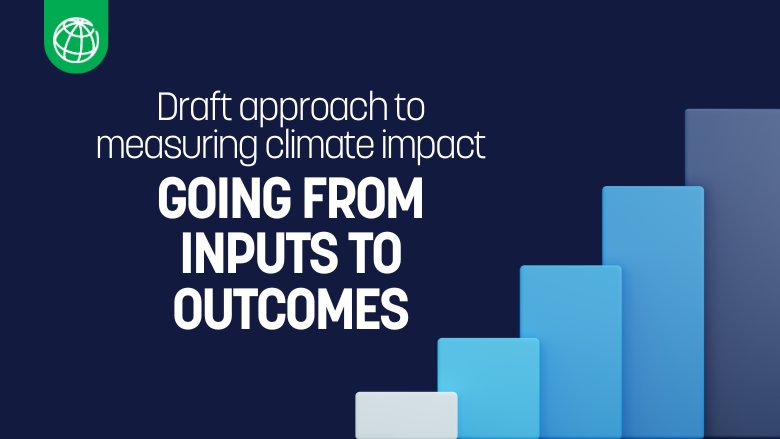>> Download: Measuring Climate Impact: A Draft Approach for Going from Inputs to Outcomes <<
Existing reporting of the Multilateral Development Bank (MDB) climate finance commitments does not tell the whole story. The MDBs have made significant progress in scaling up climate finance commitments. However, climate finance neither measures the results nor the outcomes of climate actions. While more climate financing may lead to better climate and development outcomes, the relationship is not necessarily one to one. There is a need for a common approach to reporting climate results that could be adopted across the MDBs, and potentially more widely across financial markets, to better signal what works and should be scaled and replicated, versus what does not and requires course correction to mobilize the financing needed to support the goals of the Paris Agreement.
This Discussion Paper, “Measuring Climate Impact: A Draft Approach for Going from Inputs to Outcomes” is based on inputs from MDB working groups on mitigation and adaptation, as well as UN agencies, academic institutions, think tanks, and other international experts. It reflects a consensus around the necessity of shifting institutional focus on climate efforts towards an outcome orientation.
The Paper proposes a framework to define, measure, and link global progress on climate (mitigation and adaptation) with institutional results. It builds on the joint MDB work on climate results metrics and impact reporting and promotes an outcome-focused approach, supported by data-driven decision making and progress measurement. The approach recognizes that countries have differentiated needs and circumstances in integrating climate and development.
The Paper proposes developing climate metrics at three levels.
(i) Global and Country Indicators: to track climate mitigation as well as adaptation and resilience progress, through: (i) global greenhouse gas (GHG) emissions with the ambition to pursue efforts in line with the Paris Agreement; and (ii) the number of people that are highly vulnerable to climate risks – an essential consideration for all countries, but particularly those with the greatest development needs.
(ii) Institutional Results Indicators: to track aggregate contributions from interventions by: (i) systematically reporting the emissions footprint of all our financing operations; and (ii) tracking how many people are benefitting from resilience building measures from all our financing operations.
(iii) Project-Relevant Results Indicators: (i) measure results in priority sectors where transitions are necessary to reach net zero GHG emissions, such as energy, transport, agriculture, urban, and industry, while also tracking how to support the enabling environment; and (ii) measure project results that build climate resilience in key dimensions, such as infrastructure and built environment, ecosystems, people and firms, economic systems, and governance and institutions, in order to simplify and standardize the vast number of indicators that are in use.
The Paper is not a new reporting mechanism but rather aims to help deepen collaboration towards a common approach to measure results across countries, sectors, MDBs, the private sector, and other stakeholders. Over the next months, the goal is to collaboratively develop methodologies for the most common and relevant indicators that would contribute to a standardized approach that better measures climate and development outcomes.
An enhanced approach to outcome measurement will enable the development community to augment its impact. It will support more informed risks and boost incentives to draw in more finance from all sources to make the planet more livable for people around the world. It can also support countries to measure their own efforts and results more effectively, making it easier for them to identify and address policy bottlenecks and track private sector investment opportunities. Please provide your comments and feedback via this link.
